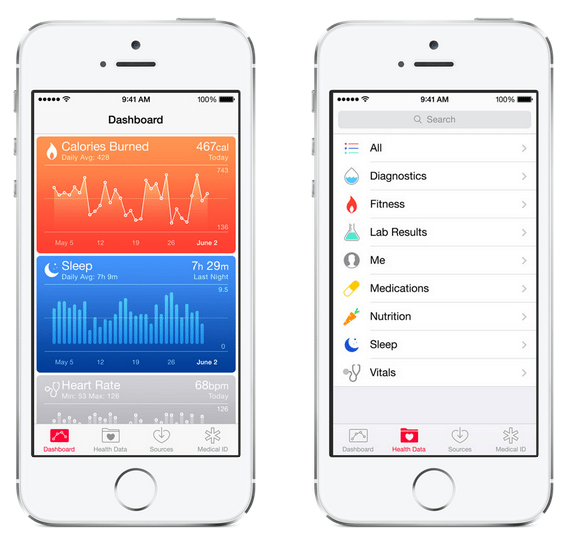Imagine a time when your mobile phone knows more about your health history than your family physician. Well, the truth is that technology is becoming such an innate part of our lives that this epoch actually isn’t that far off. In fact, technology has already become such a vital part of our modern-day healthcare.
Apple’s HealthKit
Even the tech giant Apple is jumping on the healthcare bandwagon. At Apple’s WWDC last week, Craig Federighi announced that Apple is making its very own health-related app. The new app, appropriately named HealthKit, will be bundled with iOS 8, and will allow users to create a complete picture of their health.
Similar to other health applications, HealthKit allows you to track sleeping patterns, caloric intake, and exercise. In addition, HealthKit draws health information from all of your health apps, and localizes it in one easy-to-access location on your iPhone home screen.
Unlike traditional health apps, HealthKit partnered with Mayo Clinic and Epic Systems to analyze gathered metrics. One of the goals is to use collected data to provide doctors, and users, with a thorough health history.
Though new to the iOS family, the idea isn’t exactly novel. In a recent Forbes article, Neil Versel gave us a friendly reminder of Google Health and Microsoft’s Healthvault:
Remember, the much-hyped vaporware that was Google Health signed up prestigious institutions like Cleveland Clinic. Mayo itself in 2009 entered into a partnership with Microsoft to connect with HealthVault. Both used Epic EHRs [electronic health records], and neither got a whole lot of interest in those respective PHRs [personal health records].
Both Microsoft’s HealthVault and Google Health were unsuccessful and ultimately retired. So why does Apple claim that HealthKit will “revolutionize how the health industry interacts with people?”
The Growth of Technology
Our interactions with technology have evolved over the past few years. More and more people are using mobile devices wherever they go. As part of this trend, the innovative niche of wearable technology has begun to expand. In fact, 2014 was predicted to be the year of wearable technology ( and so far this prediction is proving to be true).
As people increasingly accept wearables into their everyday lives, the odds for the mass adoption of Apple’s HealthKit increase. Interestingly enough, the impact of wearable technology in healthcare can already be felt—from implanted pacemakers to assisting doctors in surgeries. However, the full potential of wearable technology extends well beyond these confines. Innovations like Apple’s HealthKit will actually allow patients to monitor their own health.
As people become more accepting of an integrated relationship with technology, I think that health-monitoring technology can become a “normal” part of healthcare. This shift has already begun, and in my opinion, the relationship we share with technology has matured to the point where society will embrace the release of Apple’s HealthKit.
Personal Concerns
Although many embrace the idea of a closer relationship with technology, skepticism remains high. One reason is simply because people are concerned about their personal privacy.
A big concern with Apple’s HealthKit is patient privacy. With plans to store personal health data, and exchange data with Epic Systems and Mayo Clinic, there’s a potential for a patient’s privacy to be violated. Additional concerns have been raised regarding health information being provided to Epic Systems. Although data may be used to identify illness, many people are uncomfortable with their health metrics being automatically collected and stored.
In a recent article in Medical Economics, Donna Marbury highlighted some of the other personal concerns regarding HealthKit: data collection accuracy, patient privacy, and machine and human error were at the top of the list. How Apple plans to address these concerns is still unknown.
While these issues are entirely valid, it doesn’t necessarily mean that people won’t use HealthKit. For example, many Facebook users have concerns about their personal privacy, but continue to post pictures, status updates, and contact information on their Facebook Page.
It’s clear that the benefits of using Facebook outweigh personal privacy concerns. Maybe it will be the same for HealthKit.
The Future of Healthcare and Technology
Silicon Valley billionaire and venture capitalist Vinod Khosla suggests that in the years to come, technology will replace 80 to 90 percent of doctors’ roles in decision making. This is because technology can simply a better job of predicting patients’ risks for diseases, diagnosing illnesses, and pinpointing the most effective therapies.
It’s no surprise that Khosla’s extreme claims have been disputed, but it does make you think: how will technological innovations like Apple’s HealthKit impact the future of medicine; and with evolving technology, just how radical is Khosla’s prediction?
Healthcare and technology are becoming more and more intertwined, and it’s likely that we’ll continue to see this relationship rapidly progress. Whether or not society is ready to embrace HealthKit is a different story.
While the public may accept wearable healthcare technology with open arms, other concerns could potentially keep HealthKit from achieving popularity. However, if Apple addresses privacy and error concerns then perhaps it really will take a revolutionary role in the health industry.
Are you willing to hand your health data over to Apple and Epic Systems?
 Marie Dodson is the assistant editor at Torque. She graduated from Cornell University with a degree in Biology and Society. She enjoys wine, good books, and travel.
Marie Dodson is the assistant editor at Torque. She graduated from Cornell University with a degree in Biology and Society. She enjoys wine, good books, and travel.


No Comments